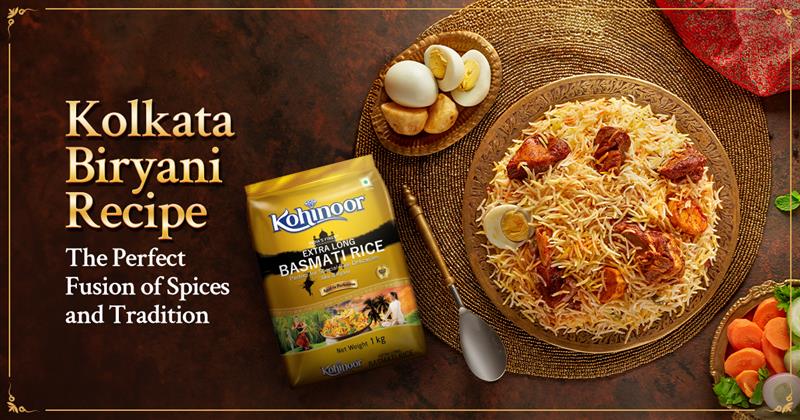Kolkata Biryani Recipe – The Perfect Fusion of Spices and Tradition

14 July, 2025
Kolkata Biryani is more than just a dish; it's an emotion for every Bengali food lover. With its subtle fragrance, melt-in-the-mouth meat, and the surprising addition of a humble potato, this biryani stands out as one of India's most unique culinary creations. Originating from the royal kitchens of the Nawabs, Kolkata Biryani blends the refined taste of Awadhi biryani with a local twist, making it lighter yet rich in flavour.
Unlike its fiery cousin from Hyderabad or the decadent Lucknowi version, Kolkata Biryani leans into delicacy. It has less oil, less masala, and a distinctive sweetness that balances perfectly with aromatic spices. One bite, and you're wrapped in a story of history, culture, and innovation. The secret? Using premium quality rice like Kohinoor Extra Long Basmati Rice. Its length, aroma, and texture elevate the biryani from good to unforgettable.
If you're wondering how to make Kolkata Biryani at home, we're sharing the ultimate Kolkata style mutton biryani recipe that combines tradition and taste. Follow along to recreate this iconic dish and make your mealtime memorable.
Origin Story
Kolkata Biryani traces its roots to the mid-19th century when Nawab Wajid Ali Shah was exiled from Lucknow to Kolkata. His royal chefs brought the art of Awadhi biryani to Bengal. However, due to economic constraints, meat was scarce, and chefs added potatoes to replace some of the mutton, thus giving birth to the now-beloved Bengali-style biryani recipe.
Over time, this adaptation became a signature. The light spices, aromatic rice, and soft, boiled potato gained cult status. Today, Kolkata Biryani is celebrated across India and abroad for its royal heritage, soul-satisfying taste, and simplicity. It's a reminder that even a dish born from limitation can evolve into something extraordinary.
How does Kolkata Biryani Differ from Other Biryanis?
Kolkata Biryani is known for its subtle elegance. Unlike Hyderabadi biryani, which is bold and spicy, Kolkata biryani is light, fragrant, and refined. It uses fewer spices, allowing the aroma of saffron and rose water to shine through.
The biggest differentiator? The aloo (potato). This humble addition is slow-cooked to soak in all the flavour, becoming a beloved part of the meal. Another key element is Kohinoor Extra Long Basmati Rice, which ensures each grain stays separate and fluffy, enhancing the eating experience.
While Lucknowi biryani is cooked in layers (dum style), Kolkata biryani adds a touch of sweetness and often includes a boiled egg, making it more wholesome.
The Perfect Kolkata Biryani Recipe
Kolkata Biryani Ingredients
- 500g mutton (bone-in)
- 2 large potatoes, halved
- 3 cups Kohinoor Extra Long Basmati Rice
- 2 onions (thinly sliced)
- ½ cup yogurt
- 1 tsp ginger-garlic paste
- ½ tsp nutmeg powder
- ½ tsp mace powder
- 1 tsp biryani masala
- ¼ tsp saffron soaked in warm milk
- 2 tbsp rose water
- 2 tbsp kewra water
- Salt to taste
- Ghee/oil for frying
- Whole spices (2 bay leaves, 4 green cardamoms, 6 cloves, 1-inch cinnamon stick)
Step-by-Step Instructions: How to Make Kolkata Biryani
- Marinate the Mutton Mix mutton with yoghurt, ginger-garlic paste, biryani masala, nutmeg, mace, and salt. Marinate for at least 2 hours or overnight.
- Fry the Onions In a deep pan, heat ghee and fry the sliced onions until golden brown. Set aside half for layering.
- Boil the Potatoes Parboil the potatoes, then fry until golden. Sprinkle a pinch of salt.
- Cook the Rice Wash and soak Kohinoor Extra Long Basmati Rice for 30 minutes. Boil water with whole spices and salt. Add rice and cook till 70% done. Drain and set aside.
- Cook the Mutton In the same pan, cook the marinated mutton with some water until tender (around 45 minutes to 1 hour).
- Layer the Biryani In a thick-bottomed vessel, start with a layer of mutton, followed by rice, fried onions, potatoes, saffron milk, rose and kewra water. Repeat the layers. Finish with ghee.
- Dum Cooking Seal the lid with dough or use a tight-fitting lid. Cook on low flame for 25-30 minutes.
- Rest and Serve Let it rest for 15 minutes before opening the lid. Fluff gently.
Serving and Pairing Ideas
Kolkata Biryani is traditionally paired with Chicken Chaap, a rich, slow-cooked chicken curry that perfectly complements the delicate spices of the biryani. The creamy, mildly spiced gravy of the chaap enhances the biryani experience, making every bite a delightful fusion of textures and flavours. You can also serve it with a side of cucumber raita or plain yoghurt to balance the richness, along with some salad.
To bring out the best in your biryani, always use Kohinoor Extra Long Basmati Rice. Its long grains, fluffy texture, and subtle aroma absorb the flavours beautifully, giving your dish an authentic restaurant-style touch.
Kolkata Biryani is a heartwarming mix of subtle spices, royal history, and cultural innovation. By following this authentic Kolkata biryani recipe with Kohinoor Extra Long Basmati Rice, you bring restaurant-quality taste to your kitchen.
FAQ's
Can I make Kolkata Biryani with chicken instead of mutton?
Yes, absolutely! Replace mutton with bone-in chicken pieces and reduce the cooking time. The flavour remains delicious.
Can I make Kolkata Biryani in a pressure cooker?
You can. Cook the meat in the cooker first, then layer with rice and use dum method in a heavy bottom pan for 10–15 minutes.
How long does it take to cook the Kolkata Biryani?
From prep to final dum, it takes around 2 to 2.5 hours worth every minute for the authentic taste!
